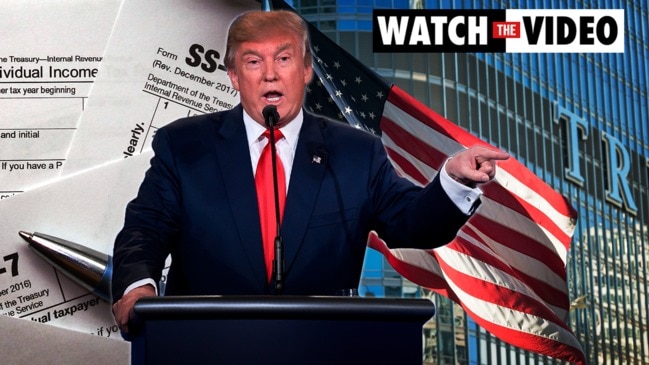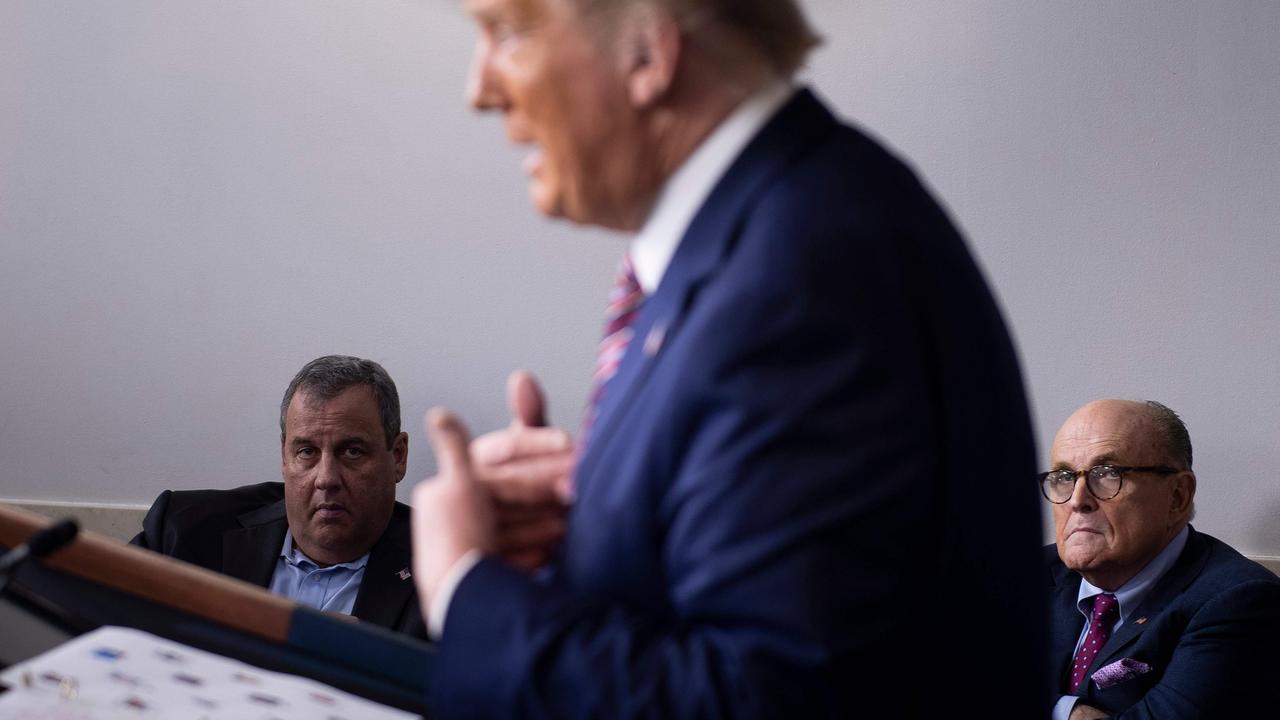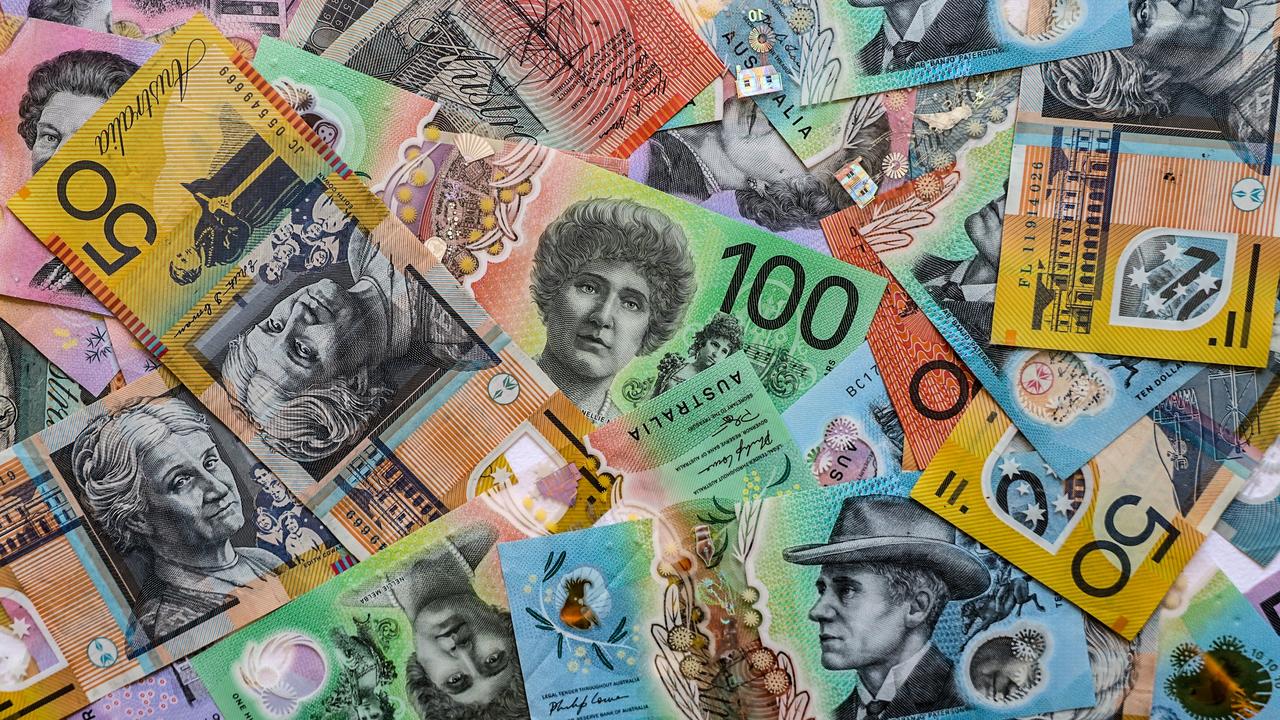Donald Trump taxes: President denies report he paid tiny amount in income taxes
For years, Donald Trump has tried to keep his tax returns private. But details of his finances have now emerged, and there are some surprises.

Donald Trump has denied a bombshell report from The New York Times, which claims the self-described billionaire has been paying a miniscule amount of income tax and has massive personal debts coming due within the next four years.
In an investigation published today, the newspaper reported that Mr Trump had paid just $750 in income tax in both 2016 and 2017, and “no income taxes at all” in 11 of the 18 years it examined.
Why? Because in those years, the businessman and reality TV host “reported losing much more money than he made”.
The Times said its reporting was based on tax return data it had obtained “extending over more than two decades”. It promised additional articles would be published in the coming weeks - awkward timing for the President as the election draws ever closer.
“The tax returns that Mr Trump has long fought to keep private tell a story fundamentally different from the one he has sold to the American public,” wrote reporters Russ Buettner, Susanne Craig and Mike McIntyre.
“His reports to the IRS (Internal Revenue Service) portray a businessman who takes in hundreds of millions of dollars a year, yet racks up chronic losses that he aggressively employs to avoid paying taxes.
“Now, with his financial challenges mounting, the records show that he depends on making money from businesses that put him in potential and often direct conflict of interest with his job as President.”
They concluded that “ultimately, Mr Trump has been more successful playing a business mogul than being one in real life”.
Perhaps the most striking revelation is that Mr Trump has personally guaranteed $421 million in loans, and most of them are coming due within the next four years - in other words, during his second term in office.
With the riches from his time on The Apprentice drying up and his highest profile businesses haemorrhaging money, he has no obvious way to pay those debts.
“Should he win re-election, his lenders could be placed in the unprecedented position of weighing whether to foreclose on a sitting president,” the authors wrote.
Mr Trump has refused to release his tax returns to the public since before the 2016 election. He has repeatedly justified that refusal by claiming they are under audit by the Internal Revenue Service (IRS).
All the way back in February of 2016, the IRS issued a statement clarifying that “nothing prevents individuals from sharing their own tax information”.
RELATED: Supreme Court rules prosecutors can pursue Trump’s taxes
RELATED: Follow all the latest news from American politics

TRUMP RESPONDS: ‘TOTALLY FAKE NEWS’
We will delve further into the details of the Times’ investigation shortly, but first, we should stress that Mr Trump has strenuously denied its veracity.
He spoke to reporters at a White House media briefing shortly after it was published.
“That is fake news. That is totally fake news, made up, fake,” Mr Trump said.
“We went through the same stories, you could have asked me the same questions four years ago. I had to litigate this and talk about it. Totally fake news, no.
“Actually I pay tax. You will see that as soon as my tax returns – it’s under audit, they’ve been under audit for a long time.
“The IRS does not treat me well. They treat me like the Tea Party, like they treated the Tea Party, and they don’t treat me well. They treat me very badly.
“You have people in the IRS, they treat me very, very badly. But they’re under audit, and when they’re not, I would be proud to show it.”
In the early 2010s, the IRS was accused of targeting organisations affiliated with the Tea Party - a populist faction of the Republican Party.
The years since then have made the scandal a bit hazier. A report from the Treasury Department’s inspector-general report found the IRS had actually subjected a large range of groups seeking tax-exempt status to extra scrutiny, including hundreds of liberal-leaning organisations.
“You have to understand that, when Americans read that you may have paid only a few hundred dollars in federal income tax per year, that seems very low for someone who’s a billionaire,” one reporter told Mr Trump as the media conference continued.
“Well basically, they’re saying I paid nothing,” the President interjected.
“Can you give people an idea of how much you actually are paying?” the reporter asked.
“You know, basically - well first of all, I’ve paid a lot. And I paid a lot of state income taxes too,” Mr Trump said.
“The New York state charges a lot, and I’ve paid a lot of money in state. It’ll all be revealed, it’s going to come out.”
“When?” the reporter pressed.
“After the audit,” he said.
President Trump denied wrongdoing and attacked the IRS in response to questions about a New York Times investigation into his taxes. https://t.co/Vf5qi7Ugr3 pic.twitter.com/Kx9dj5JKpM
— The New York Times (@nytimes) September 27, 2020
A PRESIDENT BLEEDING MONEY
Mr Trump often points to the annual financial disclosure he releases as President to further justify keeping his tax returns private.
According to The Times, those disclosures give us a “distorted picture” of Mr Trump’s finances, because they report revenue instead of profit.
To illustrate the point, it cited 2018, when the President’s financial disclosure revealed revenue of $435 million. The tax records obtained by the newspaper show his real bottom line that year was a loss of $47 million.
“Most of Mr Trump’s core enterprises - from his constellation of golf courses to his conservative-magnet hotel in Washington - report losing millions, if not tens of millions of dollars year after year,” the newspaper said.
“His revenue from The Apprentice and from licencing deals is drying up, and several years ago he sold nearly all the stocks that now might have helped him plug holes in his struggling properties.
“And within the next four years, more than $300 million in loans - obligations for which he is personally responsible - will come due.”
When Mr Trump started to run for President in 2015, citing his business acumen as a reason to elect him, his accountants were finalising his tax return from the previous year.
It became the fourth consecutive year in which he paid zero dollars in income tax.
He had been earning millions of dollars through his role in The Apprentice and various branding deals, then losing it through risky investment decisions.
“That equation is a key element of the alchemy of Mr Trump’s finances - using the proceeds of his celebrity to purchase and prop up risky businesses, then wielding their losses to avoid taxes,” said The Times.
TRUMP’S SECRET AUDIT BATTLE
That audit Mr Trump keeps talking about? It’s real.
It relates to a $73 million income tax refund he received in the 2010s, after declaring massive losses totalling $1.4 billion from his businesses during the Global Financial Crisis.
Mr Trump got back all the federal income tax he had paid between 2005 and 2008 - when The Apprentice gave him a surge in income, and therefore a higher tax bill - plus a couple of million dollars in interest.
The Times reports this was a “quickie refund”. It got processed within 90 days, pending an automatic audit from the IRS.
That audit is still pending today, for reasons the newspaper was not able to glean.
If the auditors ultimately decide that Mr Trump can’t keep the $73 million, he will be required to repay it to the government with interest, potentially adding tens of millions of dollars.

DEBTS COMING DUE
In the early 1990s, Mr Trump had dug himself into a financial hole where he was personally liable for more than $800 million in loans. He narrowly avoided personal bankruptcy.
The President appears to be in a similar situation now.
As we mentioned earlier, Mr Trump’s tax records show he has personally guaranteed $421 million in debt, most of which will come due within the next four years.
Should he win the election, he will still be President during that period. It’s unclear what his lenders would do in such a scenario, or how Mr Trump could come up with the money, given the state of his businesses.
The Times reports he has already used most of the “one shot” measures available to him to help his cash flow. Most significantly, between 2014 and 2016, Mr Trump sold about $220 million in stocks and bonds, leaving him with as little as $873,000 in securities left.
“Whether he wins or loses, he will probably need to find new ways to use his brand, and his popularity among tens of millions of Americans, to make money,” it wrote.
THE PRESIDENT’S EXPENSES
The report also included details of the business expenses Mr Trump has claimed over the years to reduce his tax bill, including more than $70,000 he spent on haircuts and styling while hosting The Apprentice.
He’s written off significant fuel and meal costs associated with his private jet, which he used to move between his various properties before getting the taxpayer-funded Air Force One.
Mr Trump has made further savings by classifying one of those properties, the sprawling Seven Springs estate in New York, as an investment property since 2014.
Under the law, for something to qualify as an investment property there should be “an actual and honest objective” of making a profit, usually by renting it out. The Trump Organisation’s website still describes Seven Springs as a “retreat for the Trump family”.
Returning to the more cosmetic side of things, entities owned by Mr Trump paid $95,000 to the hair and makeup artist for his daughter, Ivanka. That, too, was written off as a business expense.
And speaking of Ivanka, Mr Trump appears to have reduced his taxable income by treating her as a consultant to the Trump Organisation, even though she was serving as an executive there at the time.
The Times compared consulting fees claimed as tax deductions by the Trump Organisation, totalling $747,622, to financial disclosures Ivanka made when she became a White House adviser in 2017.
She said she had received the exact same figure - $747,622 - from a consulting company she owned.
“She appears to have been treated as a consultant on the same hotel deals that she helped manage as part of her job at her father’s business,” the newspaper wrote.
“If the payments to his daughter were compensation for work, it is not clear why Mr Trump would do it in this form, other than to reduce his own tax liability.”
Read related topics:Donald Trump




